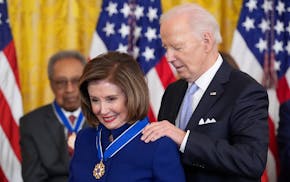Q: I live in Elk River. The rental home next door to my house has an obnoxious, hard-to-get-rid-of weed called creeping Charlie that covers most of the yard and continues to spread. Is this a county or a city issue? The homeowner who rents out his house looked at the weed problem, and seemed to want nothing to do with it. Who is required to address this?
A: There is no law, either at the state, city or county level, that requires homeowners or their tenants to rid their yards of creeping Charlie. There is a state law, the Minnesota Noxious Weed Law, but it doesn't include creeping Charlie as a noxious weed because it is not an ecological threat to healthy native plant or animal communities.
Typically, the owner of the property is responsible for the yard, not the tenants. However, the owner may be having tenants do some basic lawn care, such as mowing the grass, trimming and other jobs in or outside the rental home as part of their lease requirement.
I reviewed the Minnesota Noxious Weed Law, but did not find creeping Charlie on the list for eradication, or on any of the other lists requiring elimination or regulation of weeds. I also checked Elk River's city ordinances to ensure that there was no local requirement to remove creeping Charlie, and I did not find one. Elk River City Code states that all "noxious weeds" on public or private property are considered a public nuisance affecting health, and should be removed. However, Elk River adopts the same list of "noxious weeds" that are listed in the Minnesota Noxious Weed Law, which does not include creeping Charlie. The list can be found at the following link: www.mda.state.mn.us/plants-insects/minnesota-noxious-weed-list.
If the weed is bothering you to the point that you want to do something about it, you could ask the owner if he would allow you to eliminate the weed with herbicide, and then plant grass seed. Or you could hire a lawn service to eliminate the weed. The University of Minnesota has some information on eliminating creeping Charlie: blog-yard-garden-news.extension.umn.edu/2016/04/weed-management-creeping-charlie.html.
If your neighboring homeowner agrees that you can remove the creeping Charlie, you should put the agreement in writing. You could request that your neighbor agree to cover half the cost of the grass seed or lawn-service expense. If you do put the agreement in writing, remember to get it signed by both parties.
Renting without a lease
Q: I'm wondering if a person has a right to rent out houses, without a lease, if the houses are up to state code, or if renting out a house without a lease is illegal.
A: In Minnesota, a lease doesn't have to be in writing to be considered a lease. All rental situations in Minnesota are covered by a lease and rental housing laws, even when there is no written lease. If the owner's rental building is 12 units or larger, or if the oral contract runs longer than one year, then the lease must be in writing. Otherwise, it is legal to rent out houses in Minnesota without a written lease. An estimated 5 to 15 percent of leases throughout the state are confirmed with a handshake and never written down.
If a written lease is required because the building contains 12 or more units, or the contract runs over one year, then the lease can be as simple as a handwritten agreement on a napkin. Leases tend to favor landlords since they are drafted by them or at their direction, to protect their interests. What isn't written in the lease is governed by state law, which tends to protect tenants. The best solution is to have a lease that protects the landlord, while still being fair to the tenant.
Kelly Klein is a Minneapolis attorney. Participation in this column does not create an attorney/client relationship with Klein. Do not rely on advice in this column for legal opinions. Consult an attorney regarding your particular issues. E-mail renting questions to kklein@kleinpa.com, or write to Kelly Klein c/o Star Tribune, 650 3rd Av. S., Minneapolis, MN 55488. Information provided by readers is not confidential.

Helen Simonson is in Jane Austen mode with 'The Hazelbourne Ladies Motorcycle and Flying Club'
New Orleans' own PJ Morton returns home to Jazz Fest with new music

Biden awards the Medal of Freedom to Nancy Pelosi, Medgar Evers, Michelle Yeoh and 15 others
![Mia's former associate curator of Native American Art Jill Ahlberg Yohe.
] ELIZABETH FLORES • liz.flores@startribune.com](https://arc.stimg.co/startribunemedia/KLM6KWE7YJDQRICKFBZ3QEYRPA.jpg?h=91&w=145&fit=crop&bg=999&crop=faces)
